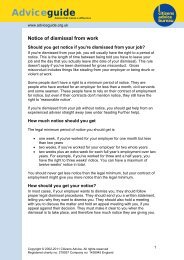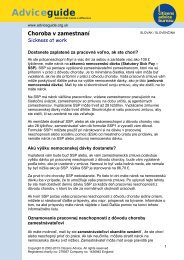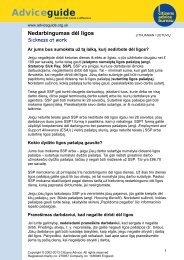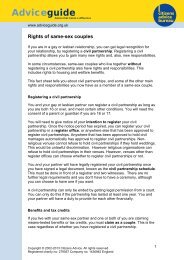Ending a marriage - AdviceGuide
Ending a marriage - AdviceGuide
Ending a marriage - AdviceGuide
Create successful ePaper yourself
Turn your PDF publications into a flip-book with our unique Google optimized e-Paper software.
Adviceguide<br />
Advice that makes a difference<br />
Information applies to Scotland only<br />
On divorce the court can make a wide variety of orders about the home and<br />
possessions. These orders will normally be made along with orders about money.<br />
If you decide to leave your home, depending on your circumstances you may be<br />
able to apply for long-term accommodation from your local authority as a<br />
homeless person – see under Further help.<br />
Tenants<br />
If you have a joint tenancy you may be able to agree between yourselves about<br />
which one of you should get the tenancy. You can ask your landlord to transfer the<br />
tenancy. If you cannot agree, the court can be asked to decide about a transfer.<br />
The court can transfer the tenancy to your name, even if your partner is the sole<br />
tenant, or you and your partner are joint tenants.<br />
If your partner is the sole tenant they will still be responsible for paying the rent. If<br />
rent arrears are building up the landlord may seek to evict you.<br />
If the tenancy is in your name you may be able to get help with your housing costs<br />
for example housing benefit and Council Tax Reduction – see under Further help.<br />
Owner-occupiers<br />
The long-term right to ownership of your property can be decided during divorce<br />
proceedings. The court has the power to transfer property regardless of original<br />
ownership. If you decide to move out, you will usually have the right to move back<br />
in at a later date (although this is time limited), and to stop your partner selling the<br />
property without your knowledge. If there are children, the courts can include<br />
property as part of an overall settlement to protect the children.<br />
You may be able to get help with your housing costs for example, council tax<br />
benefit and help with your mortgage – see under Further help.<br />
Children<br />
At the end of your <strong>marriage</strong>, both you and your partner will be responsible for<br />
supporting your children financially, regardless of which one of you the children<br />
live with. There is a useful guide called ‘Parenting Agreement for Scotland –<br />
Guide’ available to help separating parents make decisions about the care of their<br />
children available from the Scottish Government website at www.scotland.gov.uk<br />
If it is not possible to come to a voluntary agreement for the care of your children,<br />
a court can be asked to intervene. The court can make orders about who the<br />
children should live with. The order will usually allow contact between the child<br />
and the parent with whom the child is not living, unless there are exceptional<br />
circumstances.<br />
Claims for maintenance for children are either dealt with by voluntary agreement,<br />
or from a court order or the Child Support Agency (CSA) or Child Maintenance<br />
Service (CMS). If your children live with you after your <strong>marriage</strong> ends, you can<br />
use the CSA or CMS to get maintenance for the children, but you don’t have to. If<br />
you want advice about anything to do with maintenance agreements you can<br />
phone the Child Maintenance Options (CMO) helpline on 0800 988 0988 or look<br />
at the CMO website at www.cmoptions.org.uk.<br />
www.adviceguide.org.uk 4/5<br />
Copyright © 2002-2013 Citizens Advice. All rights reserved<br />
Registered charity no: 279057 Company no: 1436945 England



![Sample debt letters [ 33 KB] - AdviceGuide](https://img.yumpu.com/50757075/1/184x260/sample-debt-letters-33-kb-adviceguide.jpg?quality=85)



